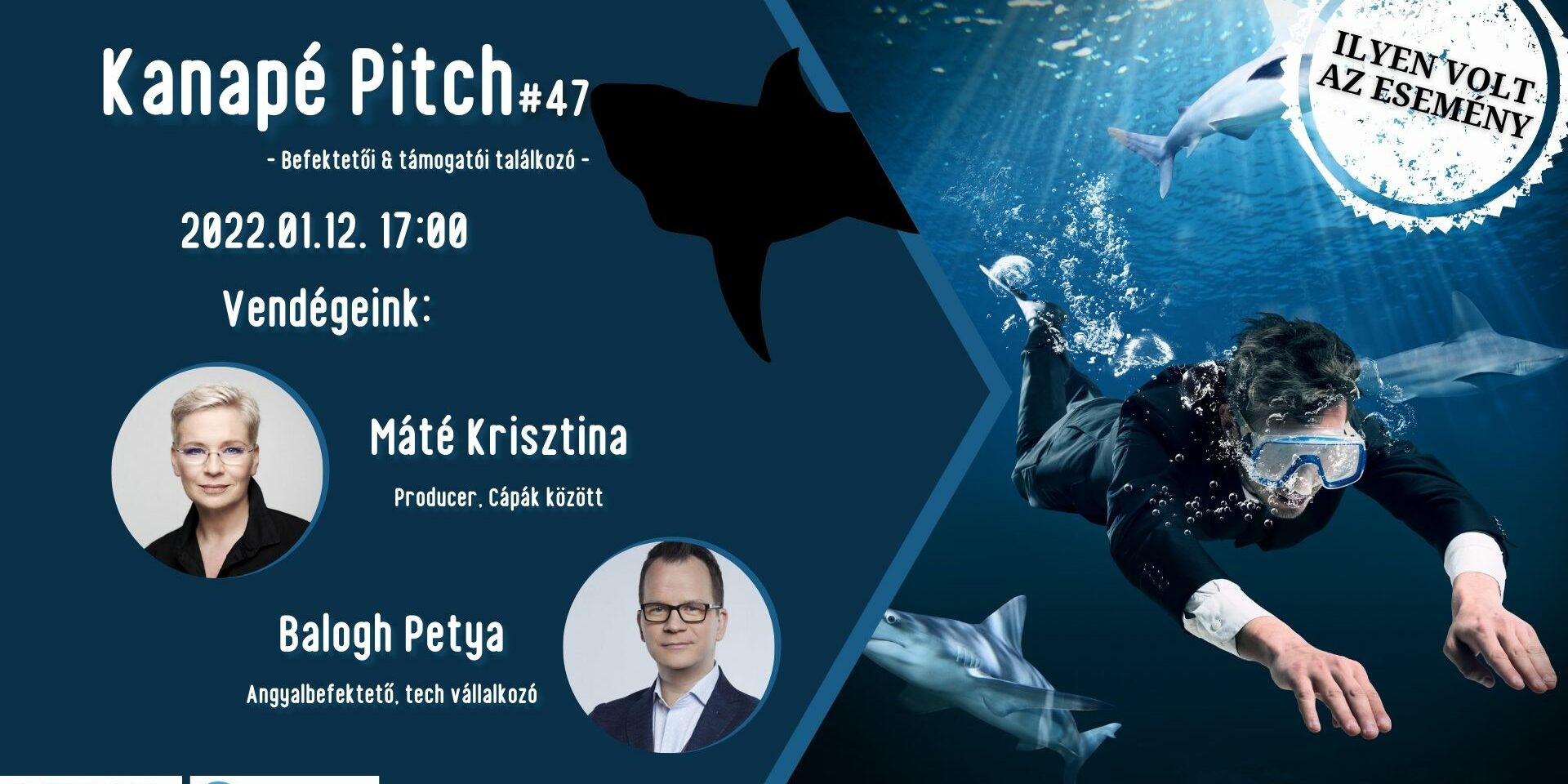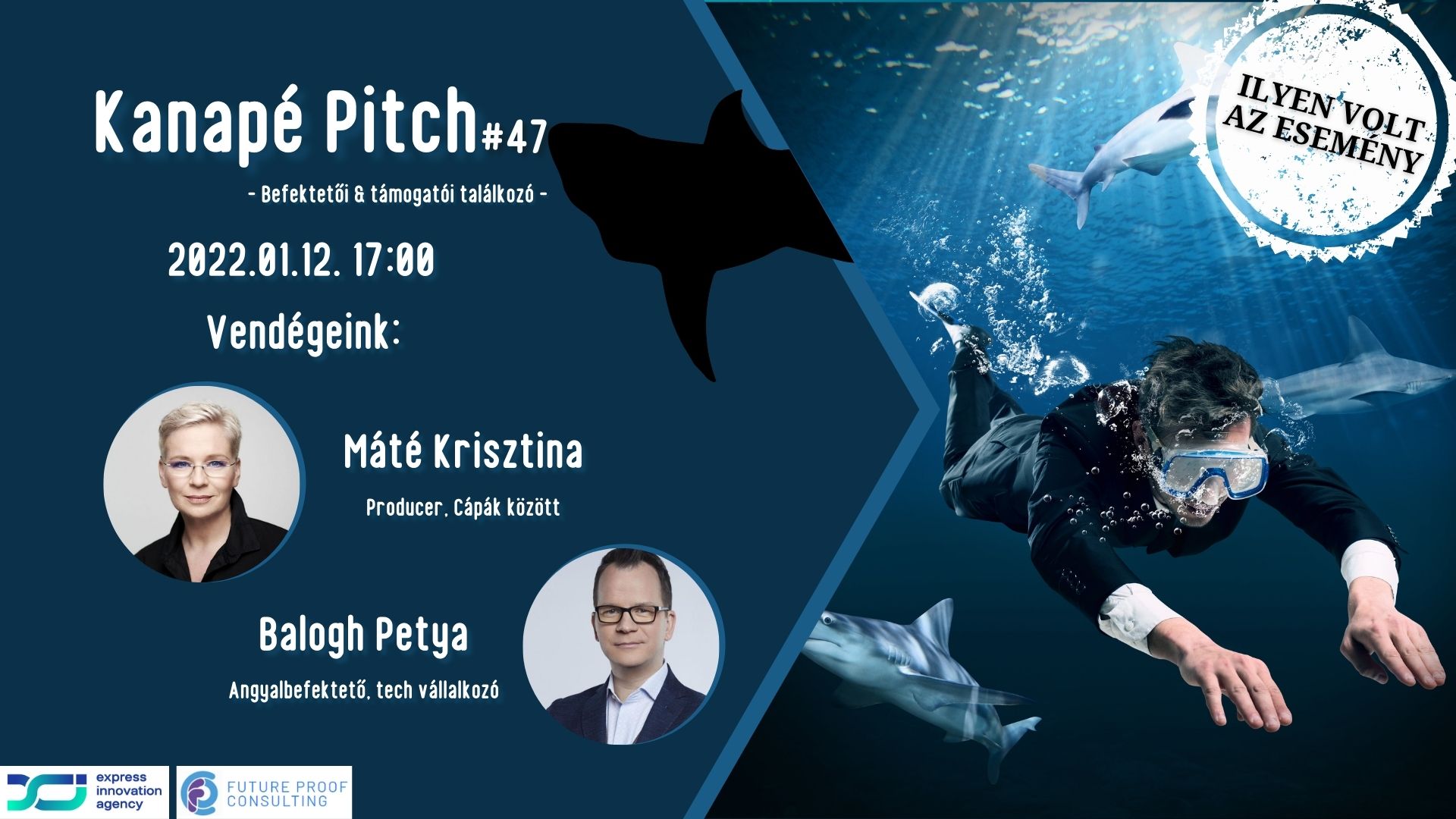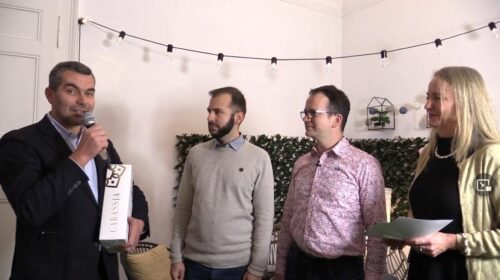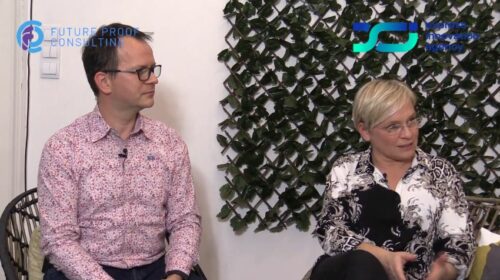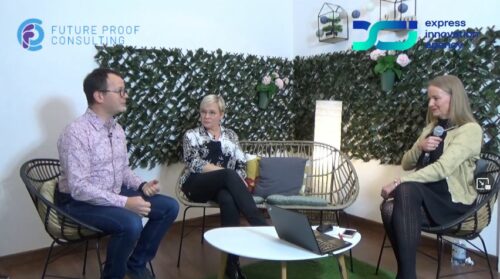#TŐKEPORTÁL BLOG
Kanapé Pitch Vol.47 | Krisztina Mate, Petya Balogh | Sharks | Express Innovation Agency
*SUMMARY
In the 47th episode of the KanapePitch, we checked in from the offices of Future Proof Consulting, where the Hungarian startup ecosystem’s 2021 Best of the Year voting was also taking place
This year, the winners were awarded with a certificate in their own name and a gift box of Carassia sparkling wine, personally presented by Zoltán Kovács, one of the owners of Kárásztelek Winery.
Zoltán explained that this winery was actually his and his fellow investors’ own start-up and venture capital investment, which they started building from scratch in 2010, cultivating nearly 23 hectares. He was delighted to be invited to present the 2018 Blanc de Blancs sparkling wines. They have already had the opportunity to experience success with Carassia sparkling wines, having previously collected numerous gold and silver medals with their products at the World Championships in London, and this year they were particularly proud to win the special prize of the President of the Jury, a unique achievement in the region. Zoltán said that it is of paramount importance to support entrepreneurship in Hungary today, which is also supported by the opportunities offered by crowdfunding, and he was delighted to toast the best in this segment.
Petya Balogh won this year’s Startup Investor of the Year award for the second time. Petya is a well-known angel investor. She said she believes the award is an excellent feedback for her that she is on the right track. He has always worked, and will continue to work, to ensure that there are more entrepreneurs and, at the same time, more successful start-ups in the Hungarian ecosystem. To this end, he is also running angel trainings, which the Tokeportal community will soon be able to learn about and participate in.
In 2021, the crowdfunding Campaigner of the Year was awarded to Kornél Kemény, CEO of SolarBnB, who launched a campaign on the TokePortal to raise capital for the launch of a solar investment marketplace. With outstanding campaign work, diligence and perseverance, Kornél raised HUF 42 million in investment from scratch, which is a very good start-up capital in the Hungarian environment. Kornél was delighted to participate in the KanapePitch again and believes that he and his team learned a lot from the campaign. The reason for this is that they were able to take their business from the idea phase to the realisation phase, which required a lot of work, repeated rethinking, and in general everything that goes with being an entrepreneur. That is why he sees this as a good way to prepare and encourages everyone, if they have a business or even an idea, to launch a crowdfunding campaign. He says that this not only gives the entrepreneur access to capital while working towards a good cause but also gives them a lot of experience and exposure.
Following a successful campaign, Solarbnb has had to overcome many difficulties; recently, the 100% subsidized solar programme and its effects have been a major challenge for the team.
The Startup of the Year was Péntech Solutions, from which Dr. Bálint Réti entered the award ceremony online. Bálint, co-founder of Péntech Solutions, a digital factoring, and SME finance service, thanked everyone who voted for them for their trust and the success that this award brings. He says it has been a good year, as the fintech company has been able to make good use of the difficulties caused by the pandemic.
As an example, he cited the successful launch of a partner certification module in cooperation with the National Chamber of Agriculture, which can be used by more than 400,000 NAK members. In addition, a digital SME lending module has been launched with MKB Bank, which means that anyone who applies for a digital loan from MKB will use the Péntech system. He also pointed out that by the end of the year, they managed to exceed 800 registered businesses on their site. And most importantly for them, they will be working with one of the world’s largest international banking groups in the factoring space – they have purchased one of their products to do this.
Another big hope for 2022 is to further strengthen their Polish business. As they are also involved in digital factoring, lending and leasing, their plan is to offer a faster and more efficient factoring service, which they expect to launch in the spring.
*Krisztina Mate and Petya Balogh
The awards ceremony was followed by the main programme, which focused on the Sharks among Sharks series.
TokePortal had an old dream come true when we had the opportunity to host the cast of the television show Among the Sharks, Krisztina Máté, the show’s producer, and Petya Balogh, one of the returning sharks, on the KanapePitch. We feel what they do is a kindred spirit to the way TokePortal works, as crowdfunding is done online what they do on TV. The increasingly popular show is a major contributor to the development of the Hungarian startup ecosystem: anyone can learn from what is said there, and every viewer can ask themselves the question “How can I be a successful entrepreneur?”. Petya has said before that it is also a mission for them to bring the word “investment” into the common vocabulary. Thanks to a growing and vibrant community and increasing viewership, the fact that this year, parts of season 4 will be aired in prime time on Sunday evenings will also help to fulfill this mission.
Krisztina used to be on screen a lot at TV2, but now she is involved in show production and production work. The way this has worked out is that in the past, TV2’s legendary CEO, Ferenc Tolvaly, wanted to keep presenters at the channel by forming companies with them in which 50% ownership was with the channel and 50% with the presenter, so there were examples where the programmes a presenter worked on were produced by his own company. This was more of a formality than a profitable business. Then, when the channel got a new CEO, they did away with this strategy by allowing presenters to buy out their companies. As a result, Kriszta became 100% owner of her own production company, but there was no channel to produce programmes for. That’s when RTL Klub called her to produce a show for the newly launched RTL II channel. His first show, which has been on the air ever since, was a series of portraits of successful entrepreneurs, who wanted to show so that people could see that there were faces in Hungary who had become successful entrepreneurs in a decent way. That’s how Krisztina got involved in the world of entrepreneurs and from there, as she put it, F “it was just a step between Sharks”. The business show, which launched in 2019, started its fourth season this year, in early January, and is now available in primetime due to excellent ratings. Shark Tank is a hit in many countries, with the 17th season in the UK and the 19th in the US. The Hungarian license is held by RTL Klub, but the channel is producing the show with its company, and the costs are shared. They do not have sponsors, but rather partners who are an integral part of the show, as they are committed to boosting the entrepreneurial and economic life in Hungary.
The aim of the programme is to help start-ups and SME entrepreneurs find investors who can help them realize their ideas or take their existing businesses to the next level. The internationally recognised investors with a successful track record, the Sharks, are looking for innovative companies to help them break into the startup world. The Sharks do not know the start-ups in advance, they meet them for the first time at the recruitment stage. There have been cases where one of the Sharks knew the entrepreneur, which is why their conversation was not interesting and was not broadcast.
Typically, start-ups apply for the show themselves, but of course, the production team may also come across an interesting venture. Recruitment can be preceded by three to five months of preparation, including a three-round casting process. There is no strict screening process, as is usual before an investment, but the creative team’s job is to check that the idea is really the entrepreneur’s and that he or she knows what they are talking about. As they get to know the companies, they prepare them for the pitch: where the camera will be, how to appear, when to do what. This is also of great importance to them, as they are there to cheer on the applicants in the background.
It is clear that more startups apply than pass the 3 rounds of casting, but even this is not a 100% guarantee that someone will make it to the show. On average, 5 companies are pitched to the Sharks in a day. They are interviewed in detail by the Sharks, but only those that are likely to be of interest to the viewers are selected for the show. Kriszta said that they try to put on the screen the meaning of all the terms that are not clear to everyone, to educate and promote the investment and start-up culture.
Petya said that when they say in the studio that they will invest in a particular business, it is only afterwards, outside the show, that serious negotiations start. That’s when the legal work, financial due diligence, and due diligence on the company takes place. At this stage, both parties still have the right to walk away from the deal. This can happen even if the entrepreneur does not want a Shark to make risky decisions in his business, but also if the Shark perceives that the entrepreneurs have embellished the numbers and the reality is different from what was previously stated. However, he noted that this is not so typical, mostly ending with an investment.
Petya is very consistent in her investments, which allows her to significantly increase her own portfolio. These start-ups are doing quite well, and he sees better companies emerging season after season. One of the reasons for this might be that entrepreneurs look at previous seasons and learn lessons from them, so they come in better prepared, and clearer about what they want and where they are. The only problems are still with a business valuation, but these are becoming more and more realistic, he says.
He is in favour of smart investing, because with his mentoring approach, when you invest in a business, you are also investing in knowledge. That is why his money is expensive compared to public or EU funding. Precisely for this reason, while start-ups are improving their pitching, they are also constantly improving their investment knowledge and decision-making process: they are becoming more cautious and taking on less work. He is particularly proud of his growing portfolio, which includes few failed startups. Before the show, he focused on a very narrow topic, technology companies, but now he covers the entire SME sector, so his investments cover a much broader spectrum. This gives him the opportunity to experience the difficulties and problems of other industries and the solutions that reflect them, which adds to his knowledge.
After the recording, editing is done afterwards, so Sharks see on average 10-20% more companies than viewers. Neither the Sharks nor the cast can predict on the fly whether there will be investment at the end of the pitch, as an entrepreneur may start off badly and then come up with convincing data at the end, but of course the reverse can also happen. After four seasons, Kriszta has a better idea of what she thinks is interesting but not visible on the screen. That’s why she thinks they have a lot more to show, as it’s a work to build and grow community. Knowledge is not necessarily retained, but shared with the viewers, thus developing the whole ecosystem.
The importance of the role of the state in building the startup ecosystem was also discussed. Nora said that studies show that there has always been a public driver for the take-off of the ecosystem. Krisztián shared that he had attended a conference earlier where this very topic came up with an Estonian and an Israeli colleague. The question was: when will the Hungarian startup ecosystem reach the Israeli level? According to Krisztián, the focus of the question is on MIKOR. For example, in Estonia we have a self-sustaining system with little state support, but in the past it took a lot of money to build the system and a lot of regulations had to be changed. Afterwards, of course, the state will have less of a role in maintaining a functioning system, which Krisztián aptly called “night watchman mode”. But the state will stay in one way or another, e.g. buying services from the start-up sector, but the question should be at what stage the ecosystem is. Usually, a more active support is needed at the beginning and then it is possible to slowly step back. At the moment in this country, we need a phase of more active support, and that is what the Express Innovation Agency wants to do with its programmes, because they say that they are successful when the start-ups are successful.
*Sztárüzenet
Sharks were followed by our campaigns.
Viktor Nyics, one of the co-founders of the platform, has signed up to Sztaruzenet, a site created together with Eva Csobán, where anyone can order a personalised video message from their favourite Hungarian celebrity. Viktor stressed that the Sztaruzenet is just the first step in a much larger infrastructure to connect Hungarian content creators with Hungarian consumers.
The campaign manager was pleased to report that the campaign is now over 30% since launch, and the next 10% investment is on its way, which will bring it to over 40% of its minimum capital target. This means that soon we will have raised 16 million forints out of the 40 million forints invested! This achievement has given them the courage to embark on a record-breaking attempt, first announced to viewers of Kanape pitch!
This idea is designed to get last-minute shoppers active, as it has now offered extra discounts as part of a record attempt. This means that the first investor after the announcement will get 100% extra bonus shares, the second extra 90% and so on, up to the 10th investor. What’s important to note is that when you invest, you need to write Record Attempt in the coupon code section, as this is the only way to keep the discount offered, which will last until midnight on 19 January (this date has been extended by an extra day for new TokePortal registrants). The deadline for this opportunity is therefore midnight on 21 January 2022!
The campaign discounts can be combined:
Minimum investment amount: 15 thousand ft.
For amounts over HUF 15.000 star founder party invitation
For amounts over HUF 1.000.000, a star founder party invitation with VIP extras
10% bonus share package for amounts above HUF 2.000.000
*Availability of extra discounts can be tracked via the Campaign Page Forum.
Together, the Star Message aims to break records, speeding up the process and bringing the goal even closer. If you want to join them in building this vision, there is no time to delay, so register your investment intentions via the campaign page as soon as possible!
*Syrius
Although Zoltán Toma’s campaign Syrius is still in the preparation phase, it only needs to comply with the legal forms of the company, as it has to transform from a limited liability company into a limited liability company in order to launch an investment campaign and issue registered shares to its investors. Once this process is complete, there will be no obstacle to starting in the closed phase. And to celebrate this, he sent viewers a teaser video about the business, their activities, and their machines. Watch the video and if you want to become a shareholder of the company, sign up for the campaign!
*Tőkeportál Saját Kampány
The 47th episode was closed by Nóra Szeles, who announced the launch of TokePortal’s own campaign! In this context, she explained in more detail the main advantages of crowdfunding and how the platform works, namely that small investors can participate in such campaigns in a simplified way, even with a minimum amount of money, and thus learn about the industry and the investments themselves. The TokePortal offered its investors a 7.5% discount on the enterprise value during the first two days of the closed phase of its own campaign, and then a 5% discount on the enterprise value until the end of the closed phase. In addition, all investors who invest more than HUF 5 million will receive a 10% discount on goodwill. The minimum capital target set by the TokePortal is HUF 30 million.


